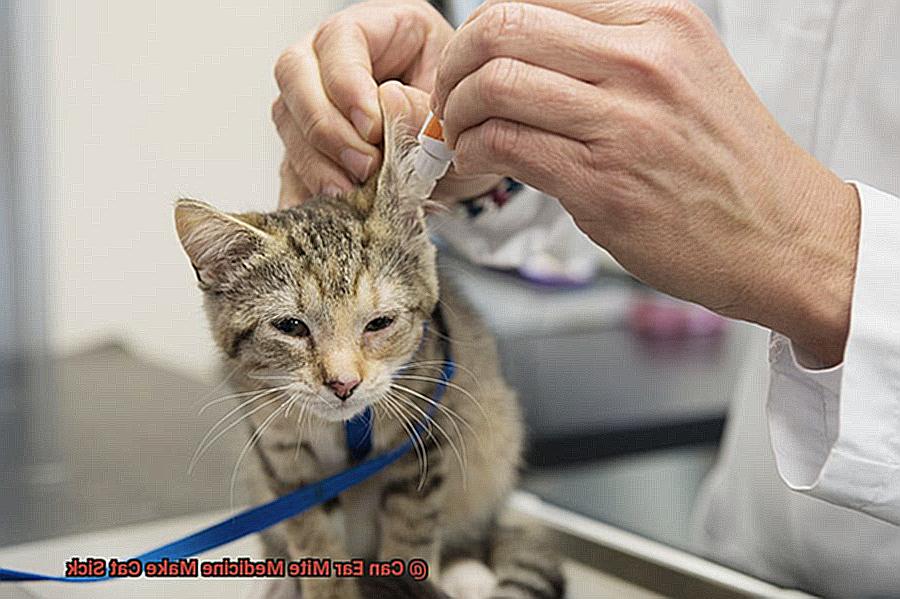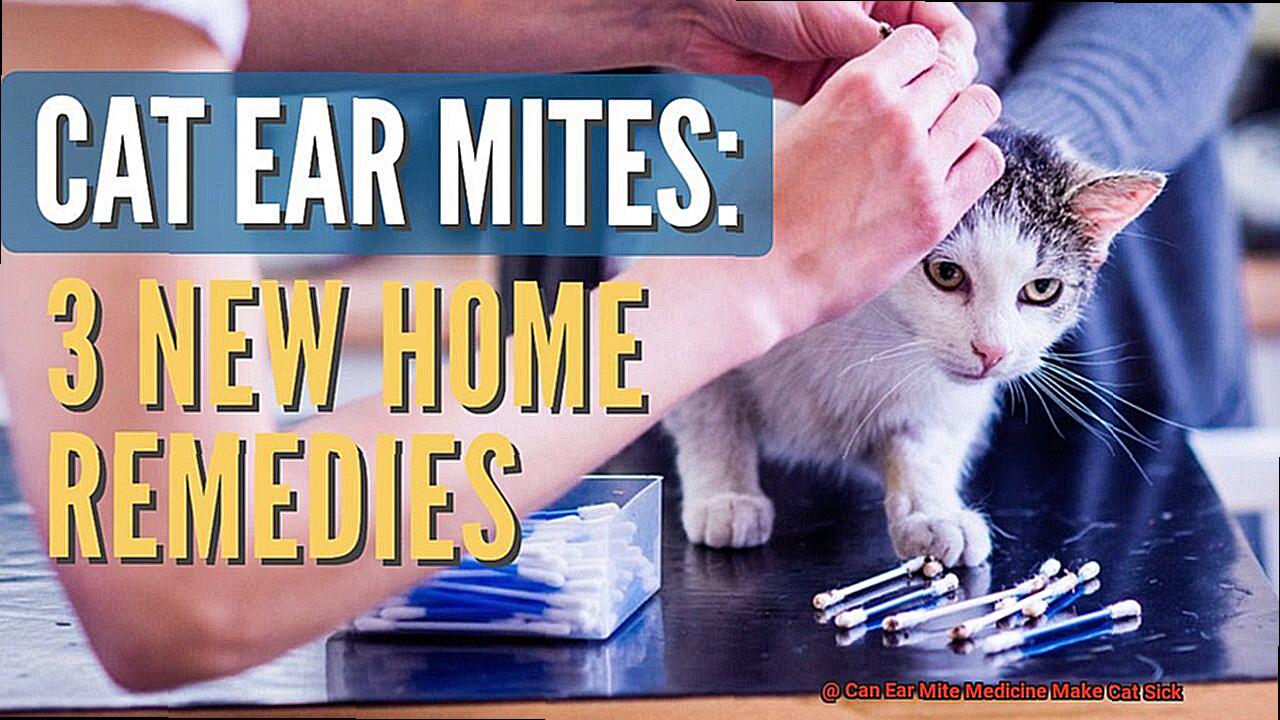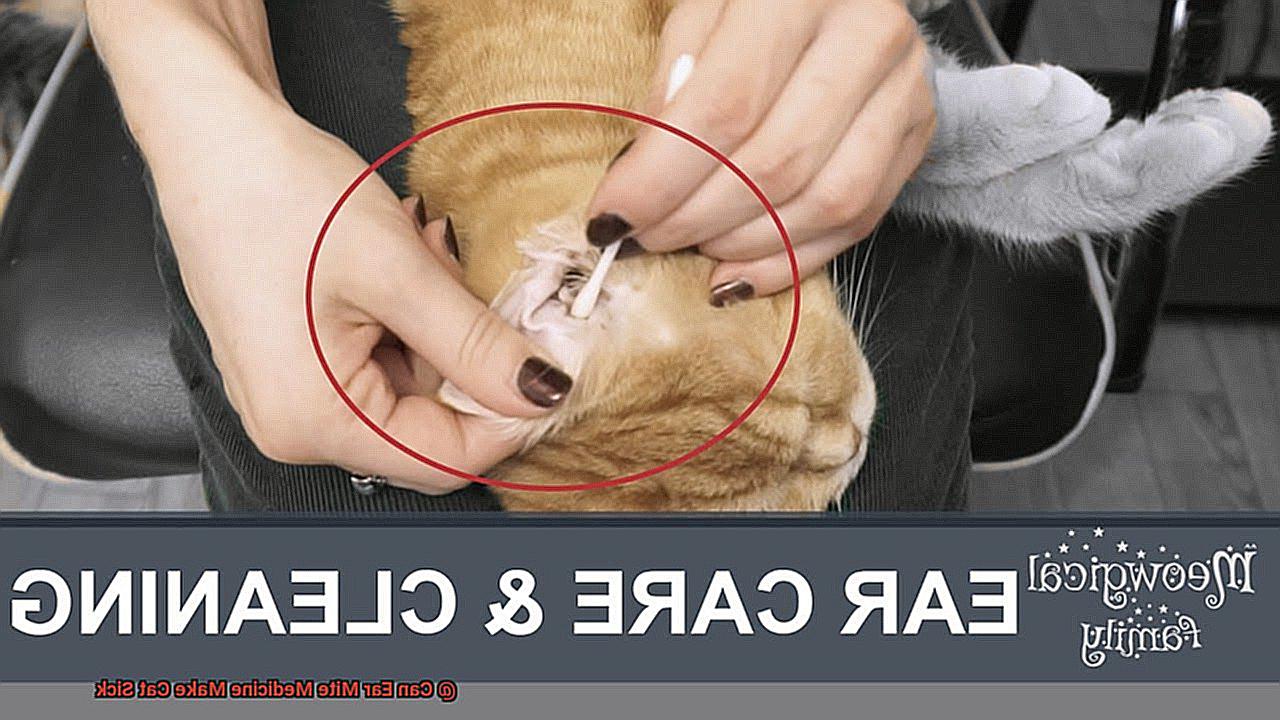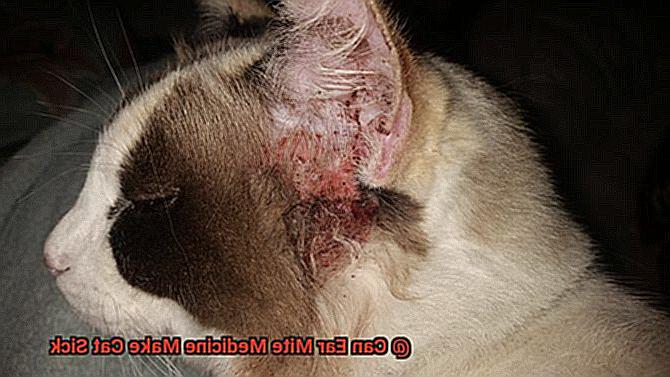When it comes to our beloved feline friends, we want nothing but the best for them. Unfortunately, ear mites are a common issue that can cause discomfort and irritation for both cats and their owners. As responsible pet parents, we may turn to medication as a solution, but what happens when the medicine intended to help actually makes things worse?
It’s a scary thought – our furry companions getting sick from something meant to make them better. That’s why it’s crucial for cat owners to be aware of potential side effects and how to identify them. Being informed can make all the difference between a quick resolution and prolonged suffering.
Ear mite medication is no exception when it comes to negative side effects. Some medicines can cause adverse reactions or even be toxic to cats. As pet owners, we need to educate ourselves on the risks involved in treating ear mites and take necessary precautions.
In this post, we’ll delve into the possible side effects of ear mite medication on cats and provide tips on how you can prevent your feline friend from falling ill. We’ll also discuss what steps you should take if your cat does experience any negative reactions from the medication.
By understanding the potential dangers of ear mite medication, we can ensure that our cats stay healthy and happy while receiving the care they need. So let’s dive in and learn how we can protect our furry companions.
What Are Ear Mites?
Ear mites are pesky little parasites that take up residence in the ear canals of cats and other animals. They thrive on the wax and oils in the ear canal, causing irritation and inflammation. This can lead to intense itching, scratching, and head shaking, which can cause further damage to the ear canal.
Ear mites are highly contagious, and they can be transmitted from one animal to another through direct contact. Outdoor cats or those who come into contact with other animals that have ear mites are particularly susceptible to infestation.

If you suspect that your cat has ear mites, it’s important to act quickly and seek treatment from your veterinarian. Common signs of an infestation include a dark discharge from the ears, a foul odor, and excessive scratching or shaking of the head. These symptoms can be frustrating for both you and your cat, but fortunately, ear mite infestations can be easily treated with medication.
There are several types of ear mite medications available, such as topical drops, sprays, and oral medications. These medications work by killing the ear mites and soothing any inflammation or irritation caused by the infestation.
It’s important to note that while ear mite medication is generally safe for cats, there are some potential side effects to be aware of. Some cats may experience mild skin irritation or redness at the site of application. In rare cases, cats may also experience more serious side effects such as vomiting, diarrhea, or seizures.
If you notice any unusual symptoms in your cat after administering ear mite medication, it’s important to contact your veterinarian right away. They can help determine if your cat is experiencing an adverse reaction to the medication and provide appropriate treatment if necessary.
In addition to seeking treatment from your veterinarian, there are also steps you can take to prevent ear mite infestations. Keeping your cat’s ears clean and dry can help reduce the risk of infection. Avoiding contact with other animals who may have ear mites can also help prevent the spread of this common parasite.
Common Symptoms of Ear Mite Infestations
Ear mites can be a pesky problem for cats and recognizing the signs of an infestation is crucial. The symptoms of ear mites in cats can vary depending on the severity of the infestation, but there are some common signs to look out for.
Firstly, intense itching is a typical symptom that your cat may be experiencing. If you notice your furry friend frequently scratching at their ears or shaking their head, this could be a sign of an ear mite infestation. Another telltale sign is a foul smell coming from your cat’s ears or a dark discharge resembling coffee grounds. This discharge is caused by ear mites feeding on wax and oils within the ear canal.
Inflammation or redness in the ear canal is another possible symptom of an ear mite infestation. This can lead to discomfort and pain for your cat, which is why it’s essential to seek treatment as soon as possible. It’s important to note that these symptoms can also be caused by other issues such as bacterial or yeast infections.
Therefore, it’s critical to have your cat properly diagnosed by a veterinarian before beginning any treatment for ear mites.
If your veterinarian confirms an ear mite infestation, they may recommend an ear mite medicine such as topical treatments or oral medications to help eliminate the parasites. However, it’s crucial to understand that some ear mite medicines may have potential side effects that could make your cat sick if not used correctly.
Can Ear Mite Medicine Make Cats Sick?
Ear mites can be a bothersome problem for cats, causing discomfort and unpleasant odors in their ears. As a responsible pet owner, it is important to seek prompt veterinary attention and administer the prescribed ear mite medicine correctly. However, it is crucial to know that some ear mite medications have the potential to make your cat sick.

Various medications are available on the market to treat ear mites in cats, but it is essential to be cautious when administering them. The most common side effects of ear mite medicine include vomiting, diarrhea, lethargy, and loss of appetite. These symptoms can arise due to various reasons, such as an allergic reaction to the medication or incorrect dosage. Therefore, it is imperative to follow the veterinarian’s instructions carefully and administer the prescribed medication in the right dose.
Additionally, some ear mite medications may contain toxic ingredients that can cause harm to cats. Pyrethrins and permethrins are commonly used in flea and tick treatments but can be toxic to cats if used incorrectly. These ingredients can cause muscle tremors, seizures, and even death in severe cases.

It is vital to conduct thorough research before purchasing any medication for your cat’s ear mites. Consult with a veterinarian and discuss the potential side effects of the medication before administering it to your cat.
Common Side Effects of Ear Mite Medicine
Unfortunately, ear mites can be a common problem for cats that can cause discomfort and potential infections. That’s where ear mite medicine comes in – it can eliminate these pesky parasites and bring relief to your cat. However, it’s important to acknowledge that this medication can also produce side effects that could make your cat sick.
The most common side effects of ear mite medicine include skin irritation, hair loss, lethargy, vomiting, and diarrhea. These reactions are typically localized around the ears where the medication is applied. Lethargy could indicate that the medication is not agreeing with your cat, while vomiting and diarrhea may occur due to the medication’s impact on their digestive system.
Allergic reactions are another potential side effect of ear mite medicine that could be life-threatening if not treated promptly. If you notice any swelling, difficulty breathing, hives, or excessive scratching in your cat after administering the medication, seek veterinary attention immediately.
To ensure your cat’s safety and well-being, it’s crucial to follow the prescribed dosage and application instructions carefully. Overdosing can lead to severe side effects that could make your cat very ill. If you notice any unusual behavior or symptoms in your cat after administering the medication, don’t hesitate to contact your veterinarian.
Allergic Reactions to Ear Mite Medication
Ear mites can be a source of discomfort for your cat, but ear mite medication can bring relief. However, it’s crucial to be aware of the potential side effects and allergic reactions that may occur.
Allergic reactions to ear mite medication in cats are rare, but they can happen. If you notice your cat experiencing itching, redness, swelling, or hives after using ear mite medication, it’s possible they may be having an allergic reaction. In severe cases, your cat may experience difficulty breathing, vomiting, or even collapse. If you observe any of these symptoms, seek veterinary attention immediately.
The most common cause of an allergic reaction to ear mite medication is the active ingredient in the medication itself. Some cats may be sensitive or allergic to certain types of medication, such as pyrethrins or permethrins. Hence, it’s essential to inform your veterinarian about any known allergies or sensitivities your cat may have before administering any medication.
Apart from the active ingredient, other ingredients in the medication can also cause an allergic reaction. These can include preservatives, fragrances, and dyes. It’s crucial to read the label carefully and avoid using any medication containing ingredients that may trigger an allergic reaction in your cat.
If your cat experiences an allergic reaction to ear mite medication, your veterinarian may recommend a different type of medication or a lower dose. In some cases, they may prescribe medication to help relieve the symptoms of the allergic reaction.
BZTPZ71K-Bo” >
How To Monitor Your Cat After Administering Ear Mite Medication
Administering ear mite medication to your cat is an important step in keeping them healthy and happy. However, it’s equally important to monitor your cat after giving them the medication to ensure that they are not experiencing any adverse effects. In this blog post, we’ll cover five subtopics that will help you keep an eye on your cat and catch any potential issues early on.
Look for Allergic Reactions
Ear mite medication can sometimes cause an allergic reaction in cats, which can be life-threatening if left untreated. Keep an eye out for symptoms such as excessive itching, swelling, or difficulty breathing. If you notice any of these symptoms in your cat, contact your vet immediately.

Monitor for Vomiting or Diarrhea
Some cats may experience vomiting or diarrhea after receiving ear mite medication. While this is generally not a cause for concern, it’s important to monitor your cat’s eating and drinking habits. If the vomiting or diarrhea persists or if your cat stops eating or drinking, call your vet for advice.

Check for Behavioral Changes
After administering ear mite medication, observe your cat’s behavior closely. If they seem lethargic, have a loss of appetite, or seem disinterested in their surroundings, it may be a sign that they are experiencing side effects from the medication. Don’t hesitate to consult with your vet if you notice any significant changes in behavior.
Keep Track of Ear Discharge
Ear mite medication can cause some discharge from the ears as it works to clear out the mites. However, if you notice an excessive amount of discharge or notice a foul odor coming from your cat’s ears, it could be a sign of infection. Contact your vet if this occurs.
Follow Up with Your Vet
Even if you don’t notice any adverse effects after administering ear mite medication to your cat, it’s still important to follow up with your vet. Your vet can help diagnose and treat any issues that may arise, ensuring that your cat stays healthy and happy.
Also Read: What Does Cat Ear Wax Look Like?
Conclusion
In conclusion, ear mites can be a real nuisance for our feline friends, causing discomfort and irritation. Thankfully, ear mite medication is a common solution that can help eliminate the pesky parasites and provide much-needed relief to our cats. However, it’s crucial to be aware of the potential side effects and allergic reactions that may occur from using these medications.
As responsible pet owners, we must educate ourselves on the risks involved in treating ear mites and take necessary precautions. Seeking veterinary attention promptly if you suspect your cat has an ear mite infestation is essential. Administering prescribed medication correctly is also vital.
To ensure your cat’s safety and well-being, it’s important to monitor them closely after administering ear mite medication. Keep an eye out for symptoms of allergic reactions or adverse effects such as vomiting, diarrhea, lethargy, or loss of appetite. Additionally, pay attention to any discharge from the ears or changes in behavior.
Remember to follow up with your veterinarian even if you don’t notice any adverse effects after administering ear mite medication to your cat. They can help diagnose and treat any issues that may arise while ensuring that your cat stays healthy and happy. By being informed about potential dangers and taking necessary precautions, we can protect our furry companions while providing them with the care they need.
In short: be vigilant but don’t panic.

